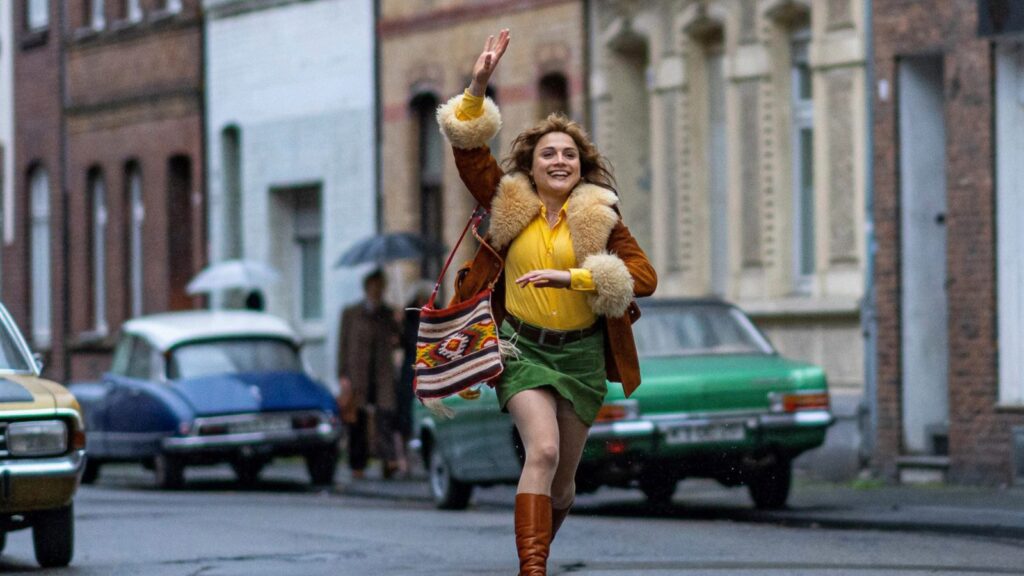Title: Köln 75
Foreign Title:
Year: 2025
Country:
Language:
Director: Ido Fluk
I should begin with a confession: The Köln Concert was my gateway into jazz. From this perspective, the film already starts on a very high note. It would be difficult to dampen my enthusiasm, but if the film had, it would have been devastating.
To spare you the suspense: I loved the film. Now I’ll simply explain what it’s about, and why it worked so well for me.
The film tells the story behind the recording of the best-selling solo jazz and piano album of all time. It centers on Vera Brandes, a young German, jazz-obsessed free-spirited teenager who becomes a concert promoter. Starting as a promoter for the Ronnie Scott’s Trio (his club in London is still a Mecca for Jazz music), she learns the trade from scratch, using her father’s dental clinic as an office. After hearing Keith Jarrett perform at a festival, she throws herself fully into bringing him to Köln for a concert, risking all her assets and future.
Against all odds, and with several major obstacles, including Jarrett’s refusal to play on a broken and mediocre piano, as well as the concert being scheduled at midnight, following a performance in the Cologne Opera House, with no time for setting up and the tuning is done during the opera, she somehow makes it happen. The result is one of the most iconic live recordings in music history.
This is framework for a straightforward, feel-good film, and in many ways it is. The film occasionally touches on familiar narrative beats, but they are small and never undermine the pleasure of its pacing and emotional flow.
But there is much more than this. To start with, the casting of 28-year-old Mala Emde as the 16-year-old Vera proves to be a brilliant choice. She brings sensuality and conviction to the role without tipping into the discomfort of sentimentality or morality (after all, she is 16).
What truly makes the film stand out is its approach to storytelling, choosing which story to tell and how. If Jarrett’s performance is Michelangelo painting the Sistine Chapel, the film, as the narrator suggests, is our view of the scaffolding. Instead of dwelling on the trivialities of what happened, how, why and when, the film evokes the cultural atmosphere of 1970s Germany, the first generation living outside the long shadow of the war. Although the war is never mentioned directly, it is present, embodied in Vera’s stern, dismissive father, whose rigid, conformist bourgeois values stand in contrast to her openness and passion. The past is never explained; it is simply felt, and here is the place to praise the costume and production design for the accurate, colorful and precise choices.
Furthermore, the film allows itself to drift, formally and structurally. It breaks away from its main narrative to follow Jarrett’s miserable overnight car journey from Switzerland to Köln,
where a journalist riding along provides insight into Jarret’s history, importance, physical exhaustion and temperament. Elsewhere, the film breaks the fourth wall several times, most importantly to allow a music critic to explain the significance genius and originality of Jarrett’s improvisational practice. These brief interruptions are surprising, but essential they help the viewer understand the intensity of Vera’s instinct and devotion.
Most strikingly, the film refuses to use the recording itself. If you love jazz, you already know the album; if you don’t, the film leaves the music as a kind of mythic absence, a sublime event that exists beyond the frame. Maybe, you will go and buy the album (or at list, download it). By refusing the obvious, Fluk frees the film to become more than just the story of a masterpiece, but a portrait of a moment in time, of youth, of artistic desire, and of the irresistible power of music.
Comments: Reviewer Anne Breaky
Hi Mercy ( Films We Like), I did see it, and I loved it. It is my zeitgeist
I loved the little reference to Gurjieff. Which explained the lifestyle and motivations of Keith Jarret. Mindfully working outside the box and, making an effort, is the right path for achieving wakefulness. This helped explain why Jarret was moved by her speech about working with the lesser piano and perhaps why it was such a stunning performance, assuming Keith Jarrett was free in a space of mindful awareness.
Even without understanding the Gurjieff reference, the description of the zeitgeist was so well told with the dialogue and the overall momentum of the film, I can’t see how anyone would not enjoy it.
I am sorry we could not write a review of this film during the festival. See Note Below
I am thinking I will try to see it again on Monday afternoon.
Good Luck with the premier!
Comments: Reviewer Ian Merkel
Hi Mercy, the film was superb, and I watched it again at VIFF Theatre on Nov1st
I certainly enjoyed it again and delved into listening to the original album and watched an interview on YouTube The Genius of Mistakes: The Real Lesson of Koln ’75.
I also looked up Vera Brandes on Wikipedia. Fascinating!
It was a perfect closing film for an outstanding festival
Thank you for reaching out and we are so happy” Films We Like” had picked it up.
Note:
As part of our society’s media accreditation with VIFF we do not review films that are Special Presentations or Galas




